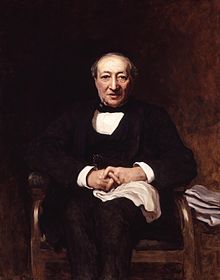Baron Burnham

Baron Burnham, of Hall Barn in the Parish of Beaconsfield in the County of Buckingham, is a title in the Peerage of the United Kingdom.[1] It was created on 31 July 1903 for the influential newspaper magnate Sir Edward Levy-Lawson, 1st Baronet, owner of The Daily Telegraph. He had already been created a Baronet, of Hall Barn in The Parish of Beaconsfield in the County of Buckingham and of Peterborough Court in the City of London, in the Baronetage of the United Kingdom on 13 October 1892.[2] Levy-Lawson was the son of Joseph Moses Levy, who acquired The Daily Telegraph only months after its founding.
Lord Burnham was succeeded by his eldest son, the second Baron. He followed his father in the management and ownership of the newspaper, but sold it in 1928 to Lord Camrose and partners. Lord Burnham also sat as a Member of Parliament. On 16 May 1919, he was created Viscount Burnham, of Hall Barn in the County of Buckingham, in the Peerage of the United Kingdom.[3]
However, he had no surviving male issue and the viscountcy became extinct on his death, while he was succeeded in the baronetcy and barony by his younger brother, the third Baron. He was succeeded by his son, the fourth Baron. He was a Major-General in the Territorial Army. His younger son, the sixth Baron (who succeeded his elder brother in 1993), was active on the Conservative benches in the House of Lords and served as a Deputy Speaker between 1995 and 2001 and 2002 and 2005 and as Conservative Deputy Chief Whip from 1997 to 2001. Lord Burnham was one of the 90 elected hereditary peers who were allowed to remain in the House of Lords after the passing of the House of Lords Act 1999. As of 2015[update], the title is held by his son, the seventh Baron, who succeeded in 2005.
The family retained an interest in The Daily Telegraph after it was sold in 1928. The fourth Baron and his son the sixth Baron were both executives of the newspaper until the Camrose interests were in turn displaced by Conrad Black in 1986.
The first Baron's sons retained the name Levy-Lawson though predominantly using Lawson, and the fourth Baron was registered with it at birth, but subsequently they have used Lawson only.
Baron Burnham (1903)
- Edward Levy-Lawson, 1st Baron Burnham (1833–1916)
- Harry Lawson Webster Levy-Lawson, 2nd Baron Burnham (1862–1933) (created Viscount Burnham in 1919)
Viscount Burnham (1919)
Baron Burnham (1903; reverted)
- William Arnold Webster Levy-Lawson, 3rd Baron Burnham (1864–1943)
- Edward Frederick Lawson, 4th Baron Burnham (1890–1963)
- William Edward Harry Lawson, 5th Baron Burnham (1920–1993)
- Hugh John Frederick Lawson, 6th Baron Burnham (1931–2005)
- Harry Frederick Alan Lawson, 7th Baron Burnham (born 1968)
There is no heir to the baronetcy and the barony.
Male-line family tree
| Male-line family tree, Barons Burnham | ||||||||||||||||||||||||||||||||||||||||||||||||||||||||||||||||||||||||||||||||||||||||||||||||||||||||||||||||||||||||||||||||||||||||||||||||||||||||||||||||||||||||||||||||||||||||||||||||||||||||||||||||||||||||||||||||||||||||||
|---|---|---|---|---|---|---|---|---|---|---|---|---|---|---|---|---|---|---|---|---|---|---|---|---|---|---|---|---|---|---|---|---|---|---|---|---|---|---|---|---|---|---|---|---|---|---|---|---|---|---|---|---|---|---|---|---|---|---|---|---|---|---|---|---|---|---|---|---|---|---|---|---|---|---|---|---|---|---|---|---|---|---|---|---|---|---|---|---|---|---|---|---|---|---|---|---|---|---|---|---|---|---|---|---|---|---|---|---|---|---|---|---|---|---|---|---|---|---|---|---|---|---|---|---|---|---|---|---|---|---|---|---|---|---|---|---|---|---|---|---|---|---|---|---|---|---|---|---|---|---|---|---|---|---|---|---|---|---|---|---|---|---|---|---|---|---|---|---|---|---|---|---|---|---|---|---|---|---|---|---|---|---|---|---|---|---|---|---|---|---|---|---|---|---|---|---|---|---|---|---|---|---|---|---|---|---|---|---|---|---|---|---|---|---|---|---|---|---|---|---|---|---|---|---|---|---|---|---|---|---|---|---|---|---|
| ||||||||||||||||||||||||||||||||||||||||||||||||||||||||||||||||||||||||||||||||||||||||||||||||||||||||||||||||||||||||||||||||||||||||||||||||||||||||||||||||||||||||||||||||||||||||||||||||||||||||||||||||||||||||||||||||||||||||||
References
- ^ "No. 27582". The London Gazette. 31 July 1903. p. 4818.
- ^ "No. 26334". The London Gazette. 14 October 1892. p. 5735.
- ^ "No. 31348". The London Gazette. 20 May 1919. p. 6247.
- Kidd, Charles, Williamson, David (editors). Debrett's Peerage and Baronetage (1990 edition). New York: St Martin's Press, 1990.
- Leigh Rayment's Peerage Pages [self-published source] [better source needed]

